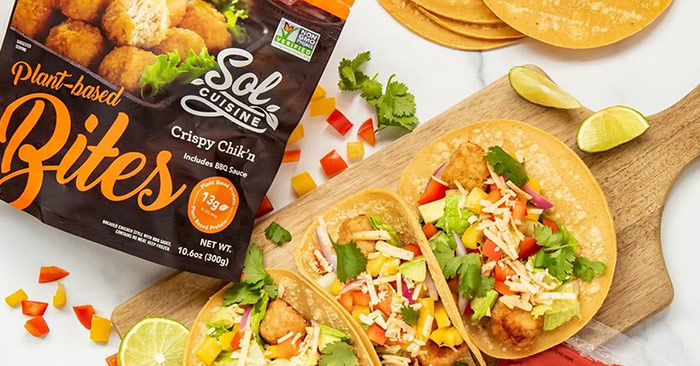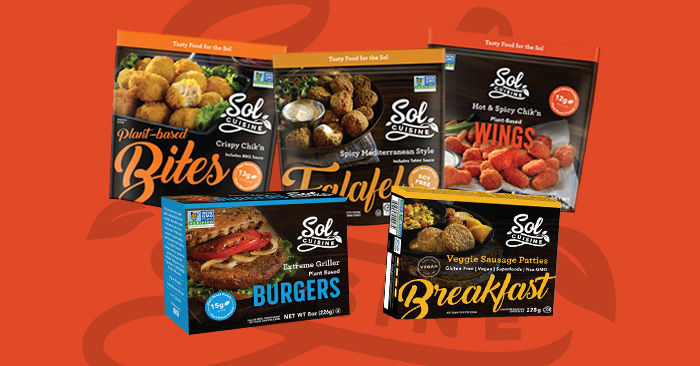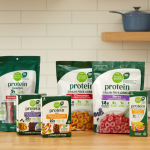Sol Cuisine To Go Public in Quest for U.S. Expansion

Sol Cuisine is heading south of the border, even as it digs financial roots up North. The plant-based Canadian frozen food brand filed this week its letter of intent to go public in Canada with the proceeds from the event used to help the company further expand into the U.S. market.
The company’s stock is expected to begin trading on the TSX Venture Exchange in mid April, bringing $30 to $34 million of capital into the company. The company will go public by undergoing a reverse takeover of a shell company in a process underwritten by Canaccord Genuity Corp. To date, the twenty-five year old company has raised $30 million, from investors including Business Development Bank of Canada (BDC), Export Development Canada (EDC), New Acres, InvestEco, Planted Power, Manitoba Harvest founder and former CEO Mike Fata.
Sol Cuisine has three lines of business for its frozen foods: a line of foodservice products (which is where the company got its start), a branded business under the Sol Cuisine name and a line of private label products copacked for retailers across North America. During the pandemic, foodservice has been down, but CEO John Flanagan said he believes that is only temporary.
The Sol Cuisine retail brand is currently sold in roughly 2300 Canadian stores and 2500 U.S. stores (including Albertsons/Safeway, Costco, Nugget, New Seasons and Jewel). Its private label items can be found in over 7,000 U.S. stores.
The company decided to go public, Flanagan said, both to raise capital and also to generate marketing buzz about the company. Flanagan and founder Dror Balshine considered looking for more venture funding, but they ultimately felt that trying to raise another $30 million from investors would be arduous, he said.

The company plans to focus on the U.S. market for the near term, parlaying its existing private label relationships with retailers to get its Sol Cuisine line into more stores. There’s manufacturing capacity to support the growth, Flanagan said. The company has a 35,000 square foot facility in Mississauga, Ontario (just over the border from New York) that can support four times its current production capacity as well as three warehouses in the U.S.; its two heads of sales are also already based in Colorado and California.
“We’ve been in the business for more than 20 years so we’re not a startup and we’ve got the product superiority,” Flanagan said. “It’s a business that has a solid foundation and we’re not looking to raise money based on a promise to try and build something, we’ve got the solid base here and we’ve been outpacing the market growth.”
Balshine said the team recognizes that the U.S market is incredibly competitive for plant-based items, but he believes in Sol Cuisine’s focus on creating differentiated, nutritionally dense products. Sol Cuisine has limits around the sodium, calories and fat it will allow in its products — numbers that other plant-based brands already surpass, he said.
In Canada, he added, the Sol Cuisine retail brand is the number three frozen plant-based product line, with the top frozen plant-based burger.
The company has no interest in getting into the bleeds-like-meat fray, preferring to try to create more culinary whole food-based items instead of turning to science, Flanagan said. While Sol Cuisine has burgers, for example, they offer flavors like Sunflower Beet or Portobello Quinoa and the line is complemented by more veggie-forward offerings such as its Spinach Chickpea Bites, Ancient Grains Chik’n Tenders, and Crispy Tempura Fillets.
“We are thankful, though, that major competitors have invested heavily in raising awareness of plant-based because if you flip back three or four years ago, it wasn’t part of the vernacular,” Flanagan said. “[But] we will be laser focused on products where we are differentiated and where we can serve the consumer better either with something they can’t get or that is superior.”













![[Updated] Oats Overnights Secures $45M Investment From Astō](https://d2azl42aua8mom.cloudfront.net/wp-content/uploads/2026/01/29172259/2026-01-29-oats-overnights-secures-45m-in-growth-equity-from-square-150x150.jpg)
